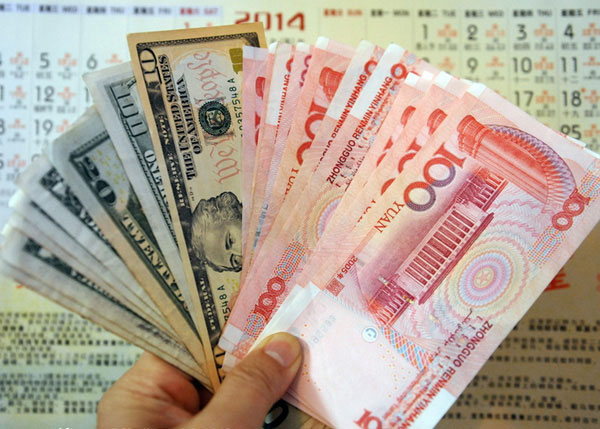 |
|
A Chinese resident displays his Chinese currency and US dollar banknotes in this file photo. [Photo/IC] |
China, it seems, is rattling a few cages in the financial markets, first of all with its interventionist moves to shore up plunging domestic stock markets, which seem to have calmed nerves at home and abroad.
Then this week came the big hammer blow – China devalued, or if you prefer depreciated, the renminbi, allowing the currency to fall in a series of moves that saw it record its biggest fall in two decades.
China's moves reverberated through the world's markets, and had the immediate effect of dragging down regional currencies such as the Australian dollar, the Japanese yen and the Singaporean dollar. In America, Republican politicians immediately complained, saying the move put undue pressure on the US dollar and crying "unfair" when they realised one effect would be to give American domestic sales and exports a bigger mountain to climb.
The moves, three in four days, will undoubtedly make Chinese exports more competitive, and there may well be more to come.
But that's only half the story.
China is eager to have the renminbi included in the International Monetary Fund's basket of currency, which make up SDRs, or Special Drawing Rights.
Currently that basket consists of Britain's pound sterling, the European Union's euro, the US dollar and the Japanese yen. Joining that elite club would, many feel, cement China's position as a world economic power.
But entry, like any exclusive club, comes with a price tag.
The International Monetary Fund, which is due to evaluate the SDR basket of currencies, and by definition China's proposed membership, has made it quite clear it wants the renminbi exchange rate to be more driven by market forces.
Until around 2005, the People's Bank of China fixed the renminbi against the US dollar, then subsequently allowed it to float against a basket of currencies within a defined band.
Starting this week, the PBOC has, in its daily fixing of the mid-point in the band, set it lower, reflecting pressure from market forces – which goes a long way to meeting those pesky IMF criteria.
You'd have thought the markets would have seen this coming, but they didn't. Shock and amazement, mixed with a little consternation, greeted the move, which most commentators in the other parts of the world tagged a devaluation.
The London Times gave it a cautious welcome, while the Financial Times was more sanguine, saying it raised the spectre of currency wars as the world's economic powers battled to preserve the positions. It also warned of a deflationary effect.
But all were united in calling it a devaluation. Well, almost all. China's state-run Xinhua news service sometimes referred to it as depreciation, stressing that the PBOC has allowed the currency to naturally depreciate.
So what is the correct term?
Economists on the web are divided – the economics help website, www.economichelp.org, says either term is ok in general use.
But then it goes on to split a few hairs – you devalue a currency with a conscious decision to lower the exchange rate when it is fixed or semi-fixed to another currency.
Depreciation is defined as a fall in the value of a currency within a floating exchange rate, i.e. a natural progression of affairs.
In China's case, we're talking about the renminbi being allowed to trade 2% either way in a fixed band.
The PBOC, in its daily fixing, has for the past four days been setting the midpoint rate lower, at the bottom end of the band.
So, as the saying goes amongst London's Cockneys, you pays your money and you takes your choice.
chris@mail.chinadailyuk.com
The author is the Managing Editor of China Daily Europe, and the views expressed here are his own.